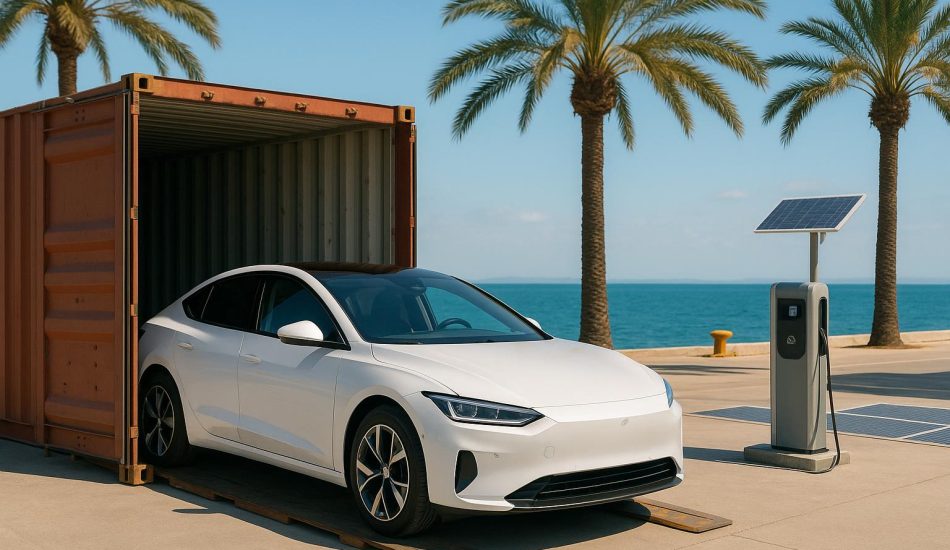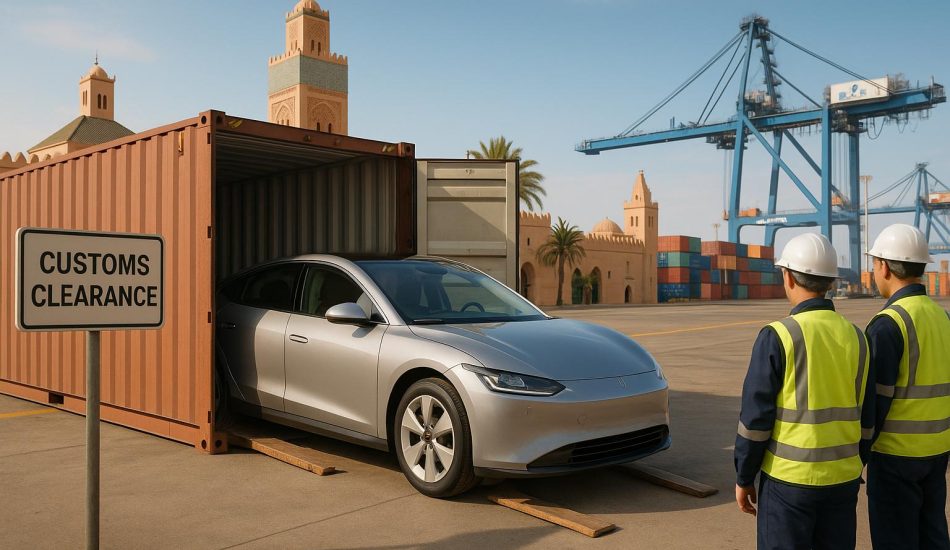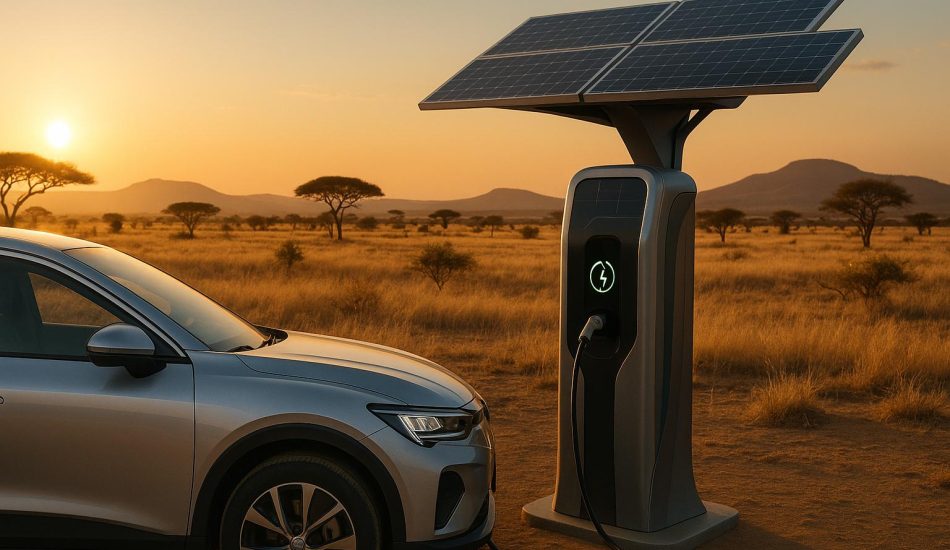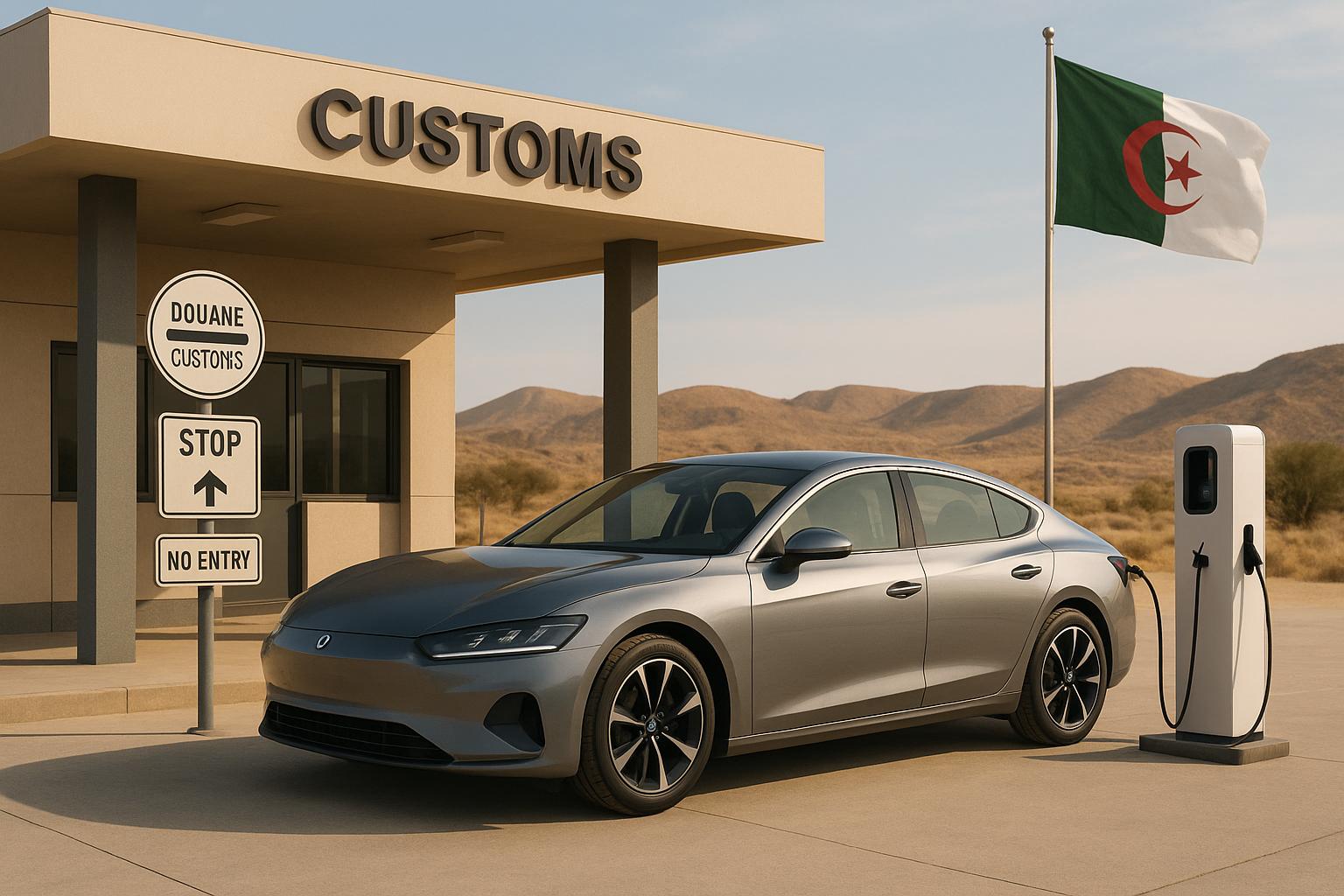
Algeria is making electric vehicle (EV) imports easier and cheaper in 2025. Here’s what you need to know:
- Tax Reductions: EV imports get up to 80% off duties and taxes, significantly lowering costs. Standard import taxes include a 30% customs duty and 19% VAT, but EVs are largely exempt.
- Individual Import Rules: One used EV (under three years old) can be imported every three years.
- Dealer Regulations: Dealers must meet quotas (15% EV sales) and specific delivery timelines (45 days max).
- Shipping Costs: Transporting a car from China to Algeria costs $2,500–$3,000.
- Safety Standards: Imported EVs must have ABS, speed limiters, and comply with Algerian technical rules.
- Payment Process: All payments must go through Algerian banks.
For example, importing a $25,000 EV could cost around $30,400 after tax reductions, including shipping. Proper documentation and adherence to regulations are critical to avoid delays. Platforms like EV24.africa simplify the process by handling sourcing, financing, and delivery.
Algeria’s updated rules aim to boost EV adoption while reducing greenhouse gas emissions. Whether you’re an individual buyer or a dealer, understanding these changes can save you time and money.
2025 Import Regulations for Electric Vehicles
EV Import Requirements
Algeria’s 2025 import regulations for electric vehicles (EVs) set clear guidelines while ensuring accessibility for a variety of EV types, including battery electric vehicles (BEVs), plug-in hybrid electric vehicles (PHEVs), range-extended electric vehicles (REEVs), and hydrogen-powered cars.
One notable requirement is that used EVs must be no older than three years at the time of import. This rule ensures the vehicles entering Algeria meet modern technology standards, particularly in safety and battery performance. Additionally, all imported EVs are required to include anti-lock braking systems (ABS) and speed limiters as basic safety features. Vehicles with motor outputs equivalent to engines larger than 1.2 liters must meet even stricter safety requirements.
Another key aspect is that payments for these imports must be processed exclusively through Algerian banks. Importers can also benefit from duty exemptions of up to 80%, although EVs accounted for less than 1% of Algeria’s vehicle market in 2024.
2025 Finance Bill Changes
The 2025 Finance Bill introduces further adjustments to regulate the EV market for both individual importers and authorized dealers. Individuals are still limited to importing one vehicle every three years, a measure designed to curb speculation while allowing fair personal import opportunities.
To prevent quick resale, the bill imposes a restriction on transferring ownership of used vehicles for three years from the date of purchase.
For authorized dealers, the bill mandates that vehicles must be delivered within 45 days of an order and within seven days of receiving full payment. It also simplifies the import process by allowing entry of vehicles without requiring localized parts or assembly, making it easier for international EV models to enter the Algerian market.
To encourage EV adoption, dealers are required to meet a 15% quota for EV sales, creating a stronger push toward integrating electric vehicles into Algeria’s automotive landscape.
Import Duties, Taxes, and Costs
Bringing electric vehicles (EVs) into Algeria involves navigating a structured system of taxes and fees, designed in part to encourage EV adoption.
Customs Duties and VAT for EVs
When importing EVs, several taxes come into play. Algeria’s standard VAT rate is 19%. However, the 2025 Finance Bill introduces temporary relief measures, including VAT exemptions for certain goods and services until December 31, 2025.
Here’s the breakdown of taxes for EV imports:
| Tax Component | Rate | Description |
|---|---|---|
| Customs Duties (DD) | 30% | Applied to the vehicle’s value |
| Provisional Revenue Control Tax (PRCT) | 2% | Administrative processing fee |
| Tax on Clearance of Goods (TCS) | 2% | Clearance fee |
| Tax on Imported Goods (TIC) | 0% | Exempt for EVs |
| Value Added Tax (VAT) | 19% | Standard rate |
Importers of EVs can benefit from an 80% reduction on duties and taxes. Additionally, a reduced customs duty rate of 5% applies to certain goods until December 31, 2025. However, verifying whether EVs qualify for this reduced rate with customs authorities is recommended.
To better understand these costs, let’s break down an example.
EV Import Cost Example
Imagine importing a mid-range electric vehicle valued at $25,000. Below is the cost breakdown before applying the 80% duty reduction:
Base Vehicle Cost: $25,000
Shipping Costs: Shipping a container from China to Algeria typically costs around $2,750.
Tax Calculations (Before 80% Reduction):
- Customs Duties (30%): $7,500
- PRCT (2%): $500
- TCS (2%): $500
- TIC (0%): $0
- VAT (19%): $4,750
Total Taxes Before Reduction: $13,250
Now, applying the 80% duty reduction, the taxes drop to $2,650.
Final Import Cost Breakdown:
- Vehicle Cost: $25,000
- Shipping: $2,750
- Reduced Taxes: $2,650
- Total Cost: $30,400
This reduction saves around $10,600 compared to standard import taxes. These figures assume eligibility for the maximum duty reduction and proper compliance with import regulations. Actual costs may vary depending on the vehicle model, shipping logistics, and exchange rates.
EV Import Process Steps
Importing an electric vehicle (EV) into Algeria involves multiple steps, from preparing the necessary documents to navigating customs and regulatory requirements. Each step must be carefully followed to avoid delays and ensure compliance with local laws.
Required Import Documents
Before shipping your EV, you’ll need to gather a range of documents. These include a sales contract, commercial invoice, packing list, certificate of conformity, inspection report, vehicle registration certificate, bill of lading, certificate of origin, and export license. Additionally, all technical and shipping documents should be professionally translated into English or French for smooth processing.
The sales contract must specify details such as buyer and seller information, vehicle specifications, the contract amount, and trade terms. The commercial invoice provides a detailed breakdown from the seller, while the packing list outlines shipping and handling specifics.
A certificate of conformity from the manufacturer confirms that the vehicle meets Algeria’s technical standards. An inspection report from a professional agency further verifies the vehicle’s quality, technical condition, and compliance with international trade norms. The vehicle registration certificate serves as proof of ownership.
If handling all this paperwork feels overwhelming, professional services are available to assist with the documentation process, ensuring everything is in order before moving on to customs clearance.
Customs Clearance and Inspections
Once your EV arrives at an Algerian port, the customs clearance process begins. This involves submitting documents, paying duties, and undergoing technical inspections – a process that can take several weeks to complete.
All required documents, including the purchase invoice, certificate of conformity, and bill of lading, must be uploaded via Algeria’s Qassimatek digital portal. You’ll also need to provide proof of insurance coverage. If you haven’t arranged for insurance in advance, you can purchase local third-party liability insurance.
Duties and taxes must be paid in full before the vehicle is released. Keep your tax receipts, as they will be needed during the technical inspection phase. Since the import license application process can take 4–6 weeks, it’s a good idea to start early.
The final step before registration is a technical inspection to confirm the EV meets Algeria’s safety and technical standards. To avoid surprises, consider pre-shipment inspections, which can identify potential compliance issues before the vehicle even reaches Algeria, saving both time and money.
Local freight forwarders and customs officials can provide valuable guidance on specific policies and requirements that may not be immediately obvious.
For commercial imports, there are additional steps that apply specifically to dealers.
Authorized Dealers and Franchise Requirements
If you’re importing EVs for resale, you’ll need to meet additional requirements. Algeria’s dealer authorization system imposes strict licensing and operational rules for businesses involved in commercial vehicle imports.
To begin, businesses must sign a franchise agreement with an automotive manufacturer. This ensures that only authorized dealers can import and sell vehicles. Dealers are limited to representing a single manufacturer, maintaining clear and exclusive relationships.
The licensing process occurs in two phases. First, dealers receive a preliminary authorization valid for 12 months, during which they must set up their operations, including facilities and qualified staff. Once this initial phase is complete, dealers can apply for a formal license from the Minister of Industry. This license requires renewal every five years.
Dealers also face ongoing operational requirements. Within their first year of receiving a license, they must establish service points in at least 28 provinces. Additionally, they are obligated to provide after-sales service and ensure spare parts availability for the duration of their contract plus an additional five years.
These rules are designed for large-scale commercial imports and don’t apply to individuals importing EVs for personal use. However, individual importers must still comply with all documentation and customs requirements.
sbb-itb-99e19e3
Compliance Tips and Cost Control
Importing an EV into Algeria requires strict adherence to regulations and careful cost management. By following the steps outlined earlier and considering the tips below, you can simplify the process and keep expenses under control. With proper planning and attention to detail, many common challenges can be avoided.
Common Import Mistakes to Avoid
Here are some frequent pitfalls to watch out for when importing an EV:
- Payment Processing: Always handle payments for vehicle imports through Algerian banks.
- Resale Timing: Be mindful of resale restrictions. Selling an imported EV within three years of purchase will require you to repay any tax credits received.
- Document Translation: Professionally translate all required documents – such as notarized sales contracts, commercial invoices, registration certificates, and import/export licenses – into English or French.
- Vehicle Cleaning: Ensure the vehicle’s underbody is thoroughly cleaned, a specific requirement under Algerian import regulations.
- License Application: Start the import license application process early, as it typically takes 4–6 weeks to complete.
- Commercial Importers: Only authorized dealerships with valid preliminary authorization and a formal license are allowed to import vehicles.
EV Import Checklist
To ensure a smooth import process, a well-organized checklist can help you stay on track.
Pre-Import Preparation (8–10 weeks before shipping):
- Verify that the vehicle complies with Algeria’s standards: no diesel engines, not older than three years, and equipped with safety features like ABS and speed limiters. Passenger cars must have a maximum of 9 seats, and commercial vehicles must have a payload of no more than 3.5 tons.
- Begin the import license application process, as this can take up to 6 weeks.
Documentation Phase (6–8 weeks before shipping):
- Collect and translate all required documents into English or French. These include the sales contract, commercial invoice, packing list, certificate of conformity, inspection report, registration certificate, bill of lading, certificate of origin, and export license. Ensure all details, such as buyer and seller information, vehicle specs, and trade terms, are clearly stated.
Financial Preparation (4–6 weeks before shipping):
- Arrange payment through an Algerian bank for all import-related transactions.
- Calculate total costs, including duties, taxes, and fees, while factoring in any available reductions.
- Prepare insurance documentation or plan to purchase local third-party liability insurance upon arrival.
Vehicle Preparation (2–4 weeks before shipping):
- Thoroughly clean the vehicle’s underbody to meet inspection standards.
- Consider scheduling a pre-shipment inspection to address any compliance issues before the vehicle arrives.
Shipping and Arrival Phase:
- Upload all required documents through Algeria’s Qassimatek digital portal upon arrival.
- Submit the purchase invoice, certificate of conformity, bill of lading, and proof of insurance.
- Pay all applicable duties and taxes and keep receipts for the technical inspection step.
- Schedule and complete the technical inspection to confirm the vehicle meets Algeria’s safety and technical standards.
Individual Import Tracking:
- If importing as an individual, maintain clear records to comply with the limit of one vehicle every three years.
Commercial Import Requirements:
- Authorized dealers must ensure their preliminary authorization is up-to-date and that they hold a valid formal license.
- Confirm adequate facilities, qualified staff, and an exclusive contract with a foreign manufacturer.
- Plan to establish service points in at least 28 provinces within the first year of obtaining a formal license.
Using EV24.africa for EV Imports
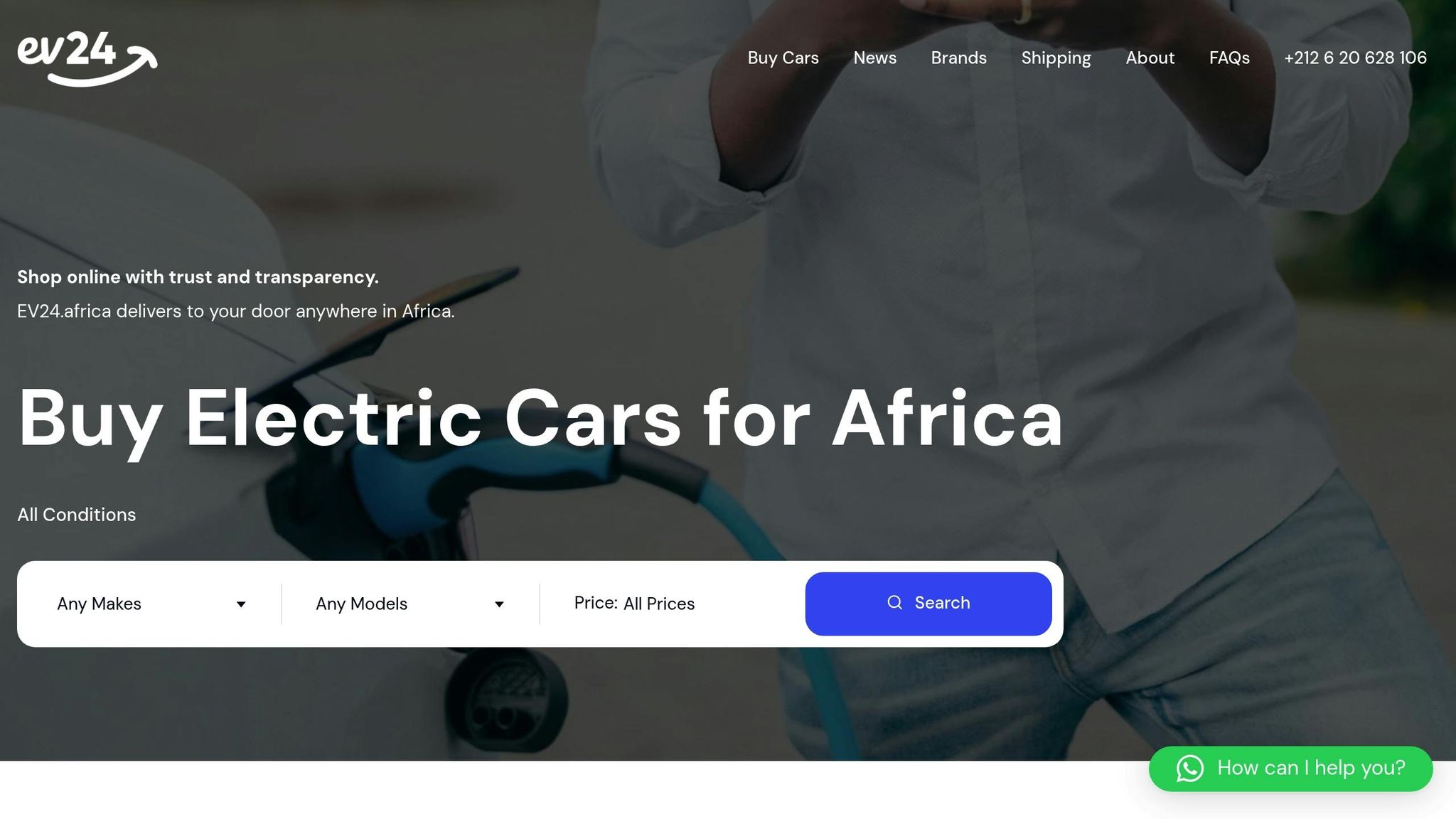
EV24.africa has created a straightforward way to manage the entire process of importing electric vehicles (EVs) into Africa. By aligning with existing regulations, the platform reduces compliance challenges and ensures a smoother experience for buyers.
The service takes care of sourcing, documentation, shipping, and delivery, making it an ideal choice for individuals and businesses across the continent.
"We simplify the process of importing and buying electric vehicles in Africa. Our expertise ensures a seamless, transparent, and stress-free experience." – EV24.africa
With delivery available in all 54 African countries, Algeria stands out as a key market. For Algerian customers, EV24.africa primarily uses the Port of Algiers to streamline customs processing and ensure timely delivery. Here’s a closer look at how EV24.africa helps with finding, financing, and delivering EVs.
Finding and Financing EVs on EV24.africa
EV24.africa provides access to a wide range of EVs from renowned manufacturers like Tesla, BYD, and Mercedes-Benz, sourced from across the globe. Prices are displayed in US dollars, making it easier for buyers to calculate total costs, including duties and taxes.
To ensure compliance with Algeria’s 2025 regulations, EV24.africa collaborates with authorized dealers and manufacturers. This guarantees that vehicles are typically under three years old, meet environmental standards, and include key safety features like ABS and speed limiters.
For financing, the platform offers flexible options, including installment plans and partnerships with financial institutions, helping buyers manage their budgets effectively.
EV24.africa Delivery Services
Once a vehicle is selected and financed, EV24.africa takes over the logistics, ensuring smooth delivery and customs processing. The platform works with experienced freight forwarders to handle essential tasks like battery safety checks, proper labeling, and providing Material Safety Data Sheets (MSDS).
Customers can choose between door-to-door or port-to-port delivery options. EV24.africa offers two main delivery terms:
- Delivered Duty Paid (DDP): EV24.africa handles all customs procedures, making it a hassle-free option.
- Free on Board (FOB): Gives buyers more control over the customs process.
For shipping, two methods are available:
| Factor | RoRo Shipping | Container Shipping |
|---|---|---|
| Cost | Lower cost | Higher cost |
| Vehicle Condition | Must be operational | Can be non-operational |
| Protection | Basic protection | Full protection |
| Number of Cars | One per slot | Up to 3–4 per container |
| Departure Frequency | More frequent | Less frequent |
| Delivery Speed | Faster transit time | Slightly slower |
Delivery times range from 4 to 8 weeks, depending on the shipping method and origin country. Customers receive regular updates, allowing them to track their vehicle throughout the process.
EV24.africa simplifies customs clearance by managing all necessary paperwork and assisting with declarations, ensuring compliance with Algerian import laws.
For example, in July 2025, Ahmed Khoualed imported a BYD Atto 3 through EV24.africa. The process, completed under DDP terms at the Port of Algiers, took just six weeks and saved him approximately $5,000 thanks to available tax reductions.
Beyond delivery, EV24.africa supports customers with after-sales services, including warranty facilitation, spare parts sourcing, and technical assistance. It also connects buyers with local service partners in Algeria for maintenance and repairs, ensuring long-term satisfaction and performance.
"EV24.africa is at the forefront of this green revolution, offering Algerian customers a seamless platform to purchase top-tier electric cars."
Conclusion
Bringing electric vehicles (EVs) into Algeria in 2025 requires navigating updated regulations and financial requirements outlined in the Finance Bill. Key points to keep in mind include the three-year import cycle for individuals, the appealing tax reductions for EVs, and the strict rules around resale repayment. These factors highlight the opportunities within Algeria’s evolving regulatory framework.
Algeria provides generous tax breaks for EV imports – up to an 80% reduction on typical fees that include 30% import duties, 19% VAT, and additional charges adding up to roughly 53% of the vehicle’s value. On top of that, maritime freight costs remain competitive.
Compliance with the rules is non-negotiable. Imported vehicles must meet safety standards, be no older than three years, and all transactions must go through Algerian banks. Resale tax repayment terms are also critical: selling within 12 months requires 100% repayment of the tax benefits, while sales between 12–24 months and 24–36 months demand 66% and 33% repayment, respectively.
Proper documentation and adherence to customs protocols are essential. Dealers are required to deliver vehicles within 45 days of order confirmation and within 7 days of full payment. Preparing in advance can help avoid shipment delays or even confiscation. Following these steps ensures a smoother import process.
For those looking for a hassle-free experience, EV24.africa offers a one-stop solution for sourcing and delivering EVs to the Port of Algiers. With in-depth knowledge of Algerian regulations and flexible financing options, the platform simplifies the complexities of importing. Additionally, EV24.africa’s services extend across all 54 African countries, making it a reliable partner for compliance and cost transparency.
"EV24.africa is at the forefront of this green revolution, offering Algerian customers a seamless platform to purchase top-tier electric cars."
FAQs
What safety features are required for electric vehicles imported into Algeria in 2025?
To comply with Algeria’s 2025 regulations, imported electric vehicles must come equipped with certain safety features. These include front airbags for both the driver and passenger, headrests on all seats, defrosting systems for the windshield and rear window, and anchors for child safety seats. Meeting these standards is crucial to ensure a smooth import process.
How will the 80% reduction in duties and taxes affect the cost of importing an EV into Algeria?
The 80% cut in duties and taxes has slashed the cost of importing electric vehicles (EVs) into Algeria, making them much more affordable for individuals and businesses alike. This change allows importers to save a large chunk of the usual fees, significantly lowering the overall cost of bringing EVs into the country.
For instance, if the standard duties and taxes on an EV are $10,000, this reduction could save up to $8,000, leaving just $2,000 to be paid. This dramatic price drop not only makes EVs more accessible but also encourages the adoption of cleaner, more sustainable transportation options across Algeria.
What are the key steps to successfully import an electric vehicle into Algeria in 2025?
To bring an electric vehicle (EV) into Algeria in 2025, the first step is obtaining approval from the Ministry of Industry. This approval is mandatory for both individual buyers and licensed dealers. Additionally, make sure the EV meets all import rules, including the updated regulation permitting vehicles up to three years old.
You’ll also need to understand the duties, taxes, and fees set by Algerian authorities. Consulting with import experts or legal professionals can be incredibly helpful in navigating the process and avoiding unnecessary delays. Keeping up-to-date with any changes in regulations will make the entire import process much smoother.


